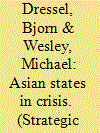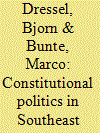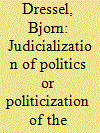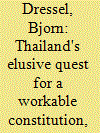| Srl | Item |
| 1 |
ID:
133600


|
|
|
|
|
| Publication |
2014.
|
| Summary/Abstract |
Problems common to many Asian states suggest a pattern of crisis in Asia. The evidence suggests that the root cause is the similarity in the patterns of political development of postcolonial states. In Asia such states have attempted to reconcile state strength and internal diversity by constructing a triangular balance between identity construction, hegemonic governance and economic development. Unfortunately, this fragile balance eroded as state structures matured and economies grew, which increasingly exposed countries to escalating crises of legitimacy and instability. By highlighting changes in the postcolonial state compact within the region, this article seeks to advance both the understanding among theorists of political developments in the region and the understanding among those who govern of the roots of the current crisis.
|
|
|
|
|
|
|
|
|
|
|
|
|
|
|
|
| 2 |
ID:
129632


|
|
|
|
|
| Publication |
2014.
|
| Summary/Abstract |
Over the last twenty-five years the constitutional landscape of Southeast Asia has changed tremendously. As in the rest of world, states in the region are dramatically alerting their constitutions, often putting in place institutional safeguard for individual rights, such as constitutional court and human right commission. Yet despite the numerous formal changes, actual constitutional practice in the region has been highly uneven. Four areas are particularly contested: constitutional drafting and design; individual and religious rights. The role of the military in constitutional politics; and the rule of law, court and justice. How states in Southeast Asia resolve unfolding conflicts in these four areas will be critical to how constitutionalism evolves in the region. Replacing traditional legal scholarship with a new perspective on how constitutional politics are contested in the region, this article seeks to advance the unfolding constitutionalism trajectories and assessing whether countries in the region are actually deepening constitutional practice in a Western liberal sense or whether the model that seems to be emerging is quite different.
|
|
|
|
|
|
|
|
|
|
|
|
|
|
|
|
| 3 |
ID:
100315


|
|
|
|
|
| Publication |
2010.
|
| Summary/Abstract |
Courts are becoming major players in the political landscape of Southeast Asia. This paper seeks to examine the causes and consequences of this new trend with particular reference to Thailand. Our study primarily analyzes the behavior of the Thai Constitutional Court during the political crisis in 2006-2008; the findings suggest that recent judicial activism and assertiveness in political matters, while partly explained by the interests of judges themselves and by the constitutional rules guiding their activities, is best understood as a direct consequence of the intervention of the monarchy, to which the judiciary has traditionally been closely aligned. Accordingly, the Thai case not only provides new evidence about what may be driving the new judicialization trend, it also draws attention to problematic aspects of this trend, namely the gradual politicization of the Thai judiciary and with it the erosion of the rule of law in Thailand and its replacement with rule by law. Our findings may also illuminate some larger issues at the intersection of politics and the courts throughout the region in ways that advance the theoretical understanding of both.
|
|
|
|
|
|
|
|
|
|
|
|
|
|
|
|
| 4 |
ID:
089915


|
|
|
|
|
| Publication |
2009.
|
| Summary/Abstract |
The "People's Constitution" drafted in 1997 was seen as a watershed event in Thai constitutional history due to the breadth and depth of its reforms. Yet just ten years later, in August 2007, a new Constitution was promulgated, the 18th since Thailand became a constitutional monarchy in 1932. The latest version followed the ouster in September 2006 of Prime Minister Thaksin Shinawatra in a military coup. This article examines the main differences between the 1997 and 2007 versions of the Constitution and how these changes relate to the current unrest in Thailand. The analysis suggests that Thailand's current instability is best understood in terms of how social struggles over access to power played out in constitutional choices. Though Thailand's urban elites and middle class had driven the drafting of the earlier Constitution, when the populist leadership it produced threatened their interests they were quick to support the traditional military and royal networks in ousting the elected government and replace the People's Constitution with one that is deliberately less democratic. Yet, because the drafting process failed to generate support beyond narrow elite circles, and the new institutional arrangements no longer provide the inclusive governance Thai people have come to expect, the new Constitution has generated tensions that suggest Thailand is unlikely to experience stability any time soon.
|
|
|
|
|
|
|
|
|
|
|
|
|
|
|
|